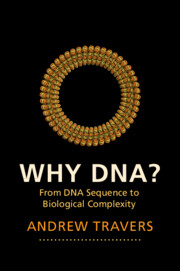Book contents
- Why DNA?
- Frontispiece
- Why DNA?
- Copyright page
- Contents
- Preface
- Acknowledgements
- 1 The Perennial Question
- 2 The Nature of Biological Information
- 3 DNA
- 4 The Evolution of Biological Complexity
- 5 Cooperating Genomes
- 6 DNA, Information and Complexity
- 7 Origins of Complexity
- 8 The Complexity of Societies
- 9 Why DNA
- General Reading and Bibliography
- Index
6 - DNA, Information and Complexity
Published online by Cambridge University Press: 05 May 2022
- Why DNA?
- Frontispiece
- Why DNA?
- Copyright page
- Contents
- Preface
- Acknowledgements
- 1 The Perennial Question
- 2 The Nature of Biological Information
- 3 DNA
- 4 The Evolution of Biological Complexity
- 5 Cooperating Genomes
- 6 DNA, Information and Complexity
- 7 Origins of Complexity
- 8 The Complexity of Societies
- 9 Why DNA
- General Reading and Bibliography
- Index
Summary
The evolution of biological systems as we understand them has been accompanied by a general increase in the complexity of their organisation. Comparing more complex organisms to simpler ones, this is apparent at many levels – a substantially increased amount of DNA, more polypeptides are required involved in the same task, a strong tendency to multicellularity, an increased sophistication of secondary information systems such as epigenetics and pheromones, mutual dependence and cooperation between disparate genomes, and of course, the evolution of a centralised information-processing device – the brain. Such progressions raise the issue as to whether the all increases in complexity are ultimately driven only by a DNA genome both containing more information and utilising this information more efficiently, or is such a perspective a reversal of the actual situation? Put simply, are there other, additional, sources of information that act as drivers of biological evolution and complexity? In other words, is it primarily an increase in total effective information content rather than just that in DNA that is responsible for the complex biological world in which we exist? If so, then a dominant role of DNA in specifying a system on which natural selection acts comes into question.
Information
- Type
- Chapter
- Information
- Why DNA?From DNA Sequence to Biological Complexity, pp. 143 - 153Publisher: Cambridge University PressPrint publication year: 2022
